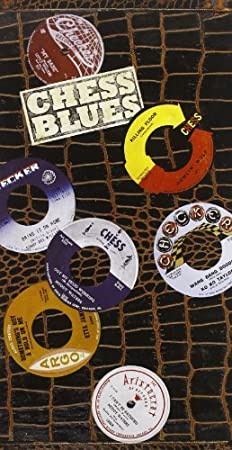
Before there was Chess Records, there were Leonard and Phillip Chess, two Jewish immigrants from Poland who came to Chicago in 1928. They were involved in the liquor business, and by the 1940’s, they owned several bars on the south side of Chicago. Of these, the largest bar was the Macomba, which had live entertainment. Many of the peformers were blues performers that had migrated to Chicago from the Mississippi delta in the 1930’s and 1940’s. They realized that these artists were not being properly recorded, so they started to record them.
In 1947, the Chess brothers entered into a partnership with Charles and Evelyn Aron, and formed Aristocrat Records. The Arons has formed Aristocrat Recods to record blues, jazz, and R&B. The most important artist on Aristocrat was McKinley Morganfield (a.k.a. Muddy Waters), who had several successful singles on the label in 1947 and 1948. The Chess brothers were able to build Muddy Waters into Chicago’s leading blues singer.
The Arons were divorced, and by 1948, Leonard Chess bought everyone out, so that only he and Evelyn Aron ran the label. By early 1950, Leonard and his brother Phil had become the sole owners, and in June, they changed the company’s name to Chess Records. The Aristocrat brand was discontinued in 1951.
In the meantime, Sam Phillips, a young record producer in Memphis, Tennesee, wa recording a 6’6″, 300 pound farm worker named Chester Burnette (a.k.a. Howlin’ Wolf). At the time, Phillips didn’t have a record label (he later established Sun Records), so he leased the Howlin’ Wolf masters to the Chess brothers. “How Many More Years” b/w “Moanin’ at Midnight” was a hit in 1951. Howlin’ Wolf soon moved to Chicago and signed with Chess Records. He would record a handful of singles which did not chart, eventually finding success which “Who Will Be Next” (#14 on Billboard’s R&B chart), and “Smokestack Lightning” (#8 R&B).
The brothers’ relationship with Phillips would bear more fruit. Phillips gave to Chess “Rocket 88” by Jackie Brenston and His Delta Cats, which topped Billboard’s R&B chart. Soon the band signed Bo Diddley, Willie Dixon, Chuck Berry, Buddy Guy, and others who were the basis of subsequent rock and roll.
In 1994, Chess released “Chess Blues”, a 4-CD compilation of the best blues recordings released by the Chess brothers. It represents an even distribution of material from over twenty years of Chess, including recordings from the Aristocrat Records era (1947-50), and from all of Chess’s subsidiaries, including Checker and Argo Records. It chronicles the entire era, from the begining of the partnership with the Arons to the untimely death of Leonard Chess at age 52 in October 1969.
I have to admit that I’m not that conversant with Chicago blues, and therefore may not be qualified to assess this compilation of music as representative of the entire genre. But we get a good sampling of music, including several tracks by Muddy Waters and Howlin’ Wolf. There’s also some excellent harmonica playing by Little Walter.
On the fourth CD, we get to hear some familar blues and R&B. On this CD, we hear some classics, many of them covered by rock artists: “The Red Rooster” and “Killing Floor” by Howlin’ Wolf, “Wang Dang Doodle” by Koko Taylor (we do not get the Howlin’ Wolf original), and “I’d Rather Go Blind” by Etta James. In retrospect, it’s hard to see what the fuss was about artists such as Led Zeppelin; they, for the most part, were just copiers of the old original blues artists.
If you wish to delve into Chicago blues and aren’t interested in tracking down the original albums, “Chess Blues” is a good start, and samples evenly from the era when Chess Records held sway. I would recommend it, along with some of the box sets representing some of the original blues artists (e.g. Howlin’ Wolf and Muddy Waters). It represents a good education for the uninitiated.
